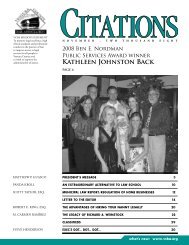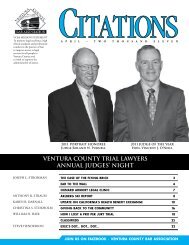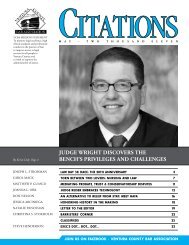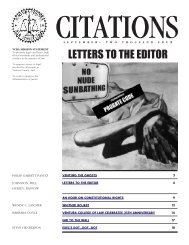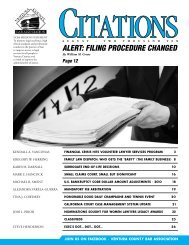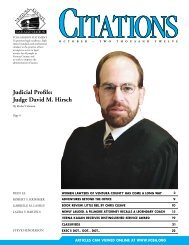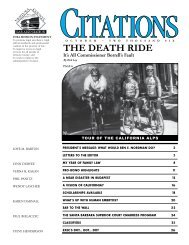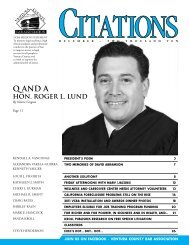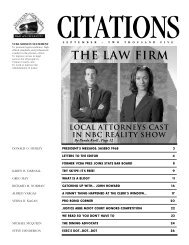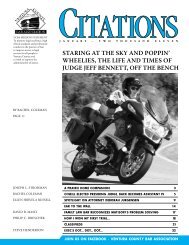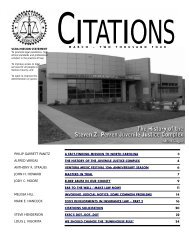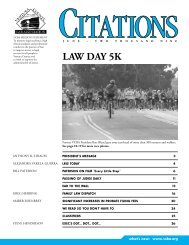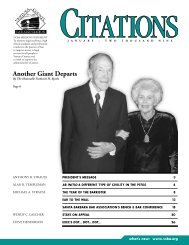judicial profile: judge nancy l. ayers - Ventura County Bar Association
judicial profile: judge nancy l. ayers - Ventura County Bar Association
judicial profile: judge nancy l. ayers - Ventura County Bar Association
Create successful ePaper yourself
Turn your PDF publications into a flip-book with our unique Google optimized e-Paper software.
8 CITATIONS • JULY 2012<br />
Family Companion or Coffee Table? The Growing Field of Animal Law<br />
By Katie Hause<br />
What is animal law? To most people,<br />
it is a trendy phrase with an ambiguous<br />
meaning. But those who have been paying<br />
close attention know that it is actually a<br />
very real movement in the legal world with<br />
exponential growth in its future.<br />
The animal law field began to take root in<br />
the 1970s with help from leading attorneys<br />
like Joyce Tischler. After learning of too<br />
many cases in which animals were subjected<br />
to lives in miserable, frustrating, and painful<br />
conditions, Tischler decided to give animals<br />
a voice and bring their needs and interests to<br />
the bargaining table. Today, the movement<br />
is gaining traction, and attorneys across the<br />
nation are researching and working on cases<br />
that are rapidly shaping the basic contours<br />
of animal rights.<br />
Animal Law is a combination of statutory<br />
law and case law in which the fundamental<br />
nature – whether it is legal, social or biological<br />
– of non-human animals is an important<br />
factor. These laws cover a broad spectrum<br />
and may concern the treatment of animals<br />
as companions, wildlife, entertainment,<br />
food and/or research subjects. There are<br />
many intersections between traditional<br />
law and animal law. Today, the animal law<br />
field includes, but is not limited to, cases<br />
concerning housing disputes involving<br />
animals, criminal law involving domestic<br />
and animal abuse, custody battles over<br />
companion animals, pet trusts, veterinary<br />
malpractice cases, cruelty cases, endangered<br />
species issues, and damages cases involving<br />
the wrongful death of a companion animal.<br />
The animal law movement today is often<br />
compared to the environmental law<br />
movement 30 years ago. In 1972, Professor<br />
Christopher Stone wrote an essay titled,<br />
“Should Trees Have Standing?” explaining,<br />
among other topics, that at different times in<br />
history, certain individuals including women,<br />
minorities, non-citizens, and children did<br />
not have equal rights or standing to sue on<br />
their own behalf. Each of these movements<br />
was originally confronted with strong<br />
opposition from individuals who called<br />
the proposed expansion of rights laughable<br />
or absurd, but with time, education, and<br />
debate, each of the aforementioned groups<br />
was given more substantial rights. We<br />
are currently witnessing a similar debate<br />
regarding the rights of gay and lesbian<br />
individuals and couples.<br />
I was drawn to the area of animal law while<br />
attending the <strong>Ventura</strong> College of Law, where<br />
I joined the VCL chapter of the Student<br />
Animal Legal Defense Fund, a student<br />
branch of the Animal Legal Defense Fund<br />
(aldf.org). Being involved in this organization<br />
and taking an animal law course opened my<br />
eyes to the many ways that our lives are<br />
intertwined with the lives of animals, and I<br />
felt a curiosity and a responsibility towards<br />
them. Much like my probate practice, where<br />
I handle conservatorships or trust estates<br />
for incapacitated persons, I believe that my<br />
animal cases help those who cannot speak<br />
up for themselves. Many people are deeply<br />
invested in their relationship with animals,<br />
and the animal law movement is working<br />
to protect that investment with more rights<br />
for animals, both companion animals and<br />
others.<br />
Pursuant to current property law, animals<br />
are chattel, the personal property of their<br />
owners. Statutes and cases refer to animals<br />
as “property,” therefore giving animals<br />
little to no value or legal rights. But we are<br />
witnessing a shift. In San Jose Charter of Hells<br />
Angels Motorcycle Club v. City of San Jose (9th<br />
Cir. 2005) 402 F. 3d 962, 975, the Ninth<br />
Circuit stated that “We have recognized that<br />
dogs are more than just a personal effect.<br />
The emotional attachment to a family’s dog<br />
is not comparable to a possessory interest in<br />
furniture.”<br />
In 2005, the ALDF was granted a permanent<br />
injunction against <strong>Bar</strong>bara and Robert<br />
Woodley in the largest civil animal cruelty<br />
case in history and given custody of the<br />
325 dogs found on the property. In 2007,



